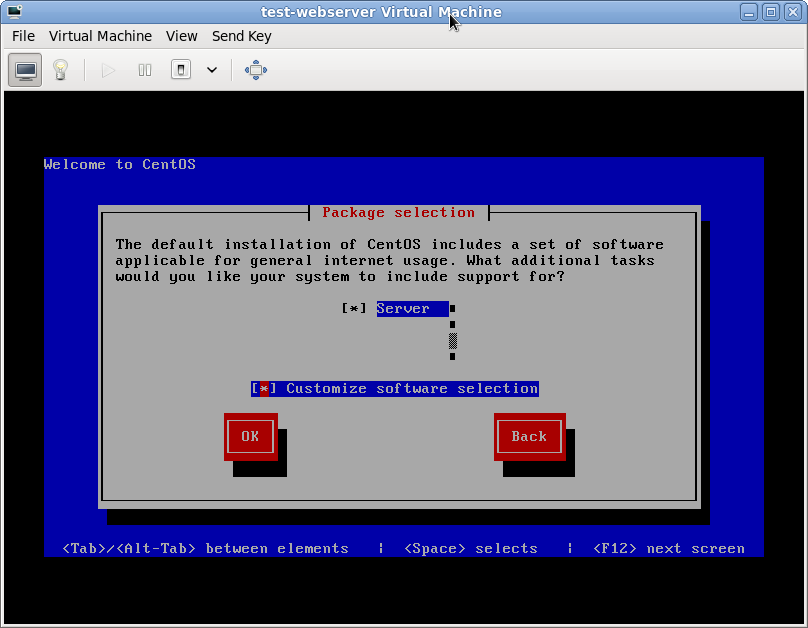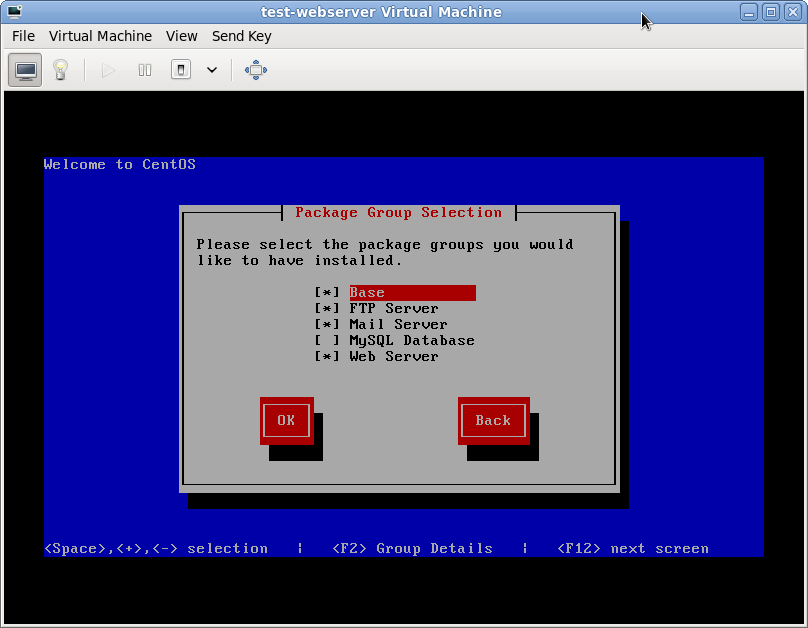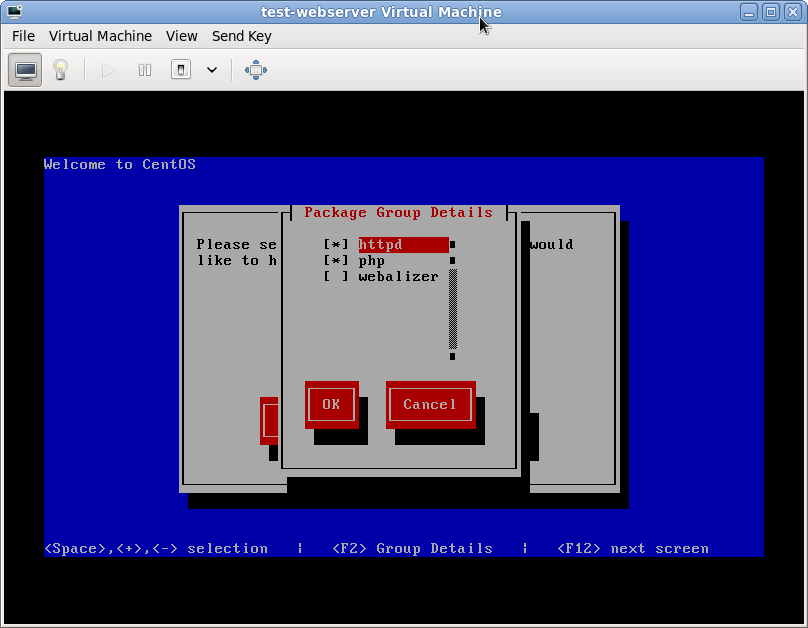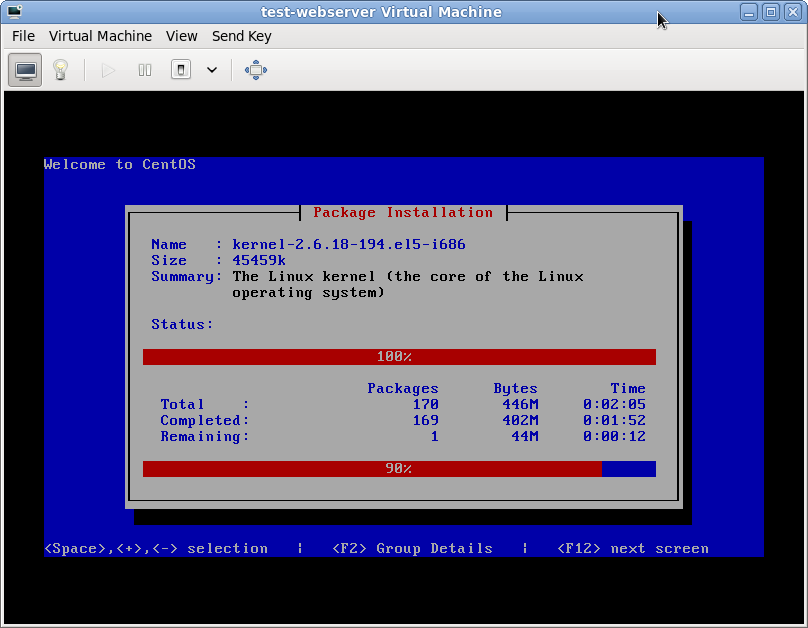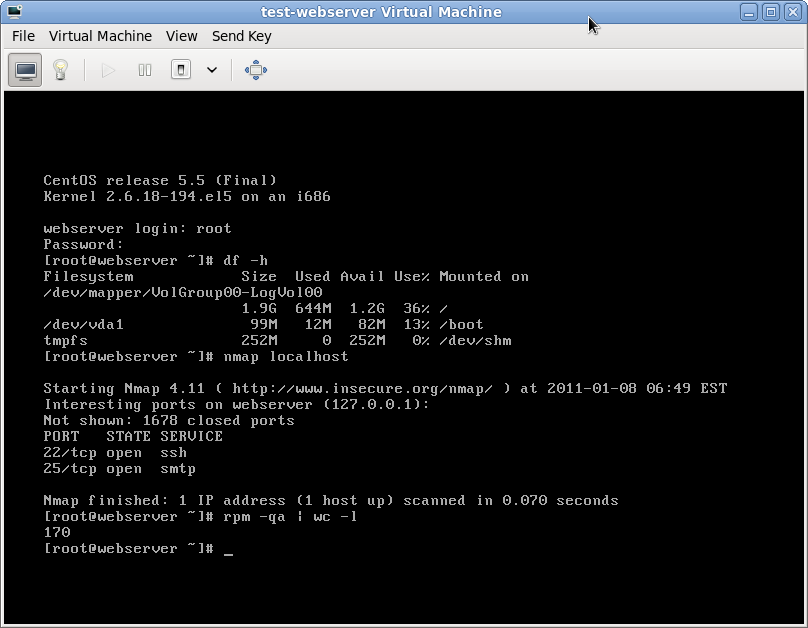CentOS 5.5 i386 Webserver Edition (Minimal)
From WBITT's Cooker!
m (→Synchronize the transitRPMs location with the build-tree) |
(→Edit the comps.xml file as per requirements) |
||
| (7 intermediate revisions not shown) | |||
| Line 137: | Line 137: | ||
Here is how to pull just the kernel and all of it's related dependencies. | Here is how to pull just the kernel and all of it's related dependencies. | ||
<pre> | <pre> | ||
| - | [root@buildhost-32 tmp]# yumdownloader --destdir=/tmp/transitRPMs/ --installroot=/tmp | + | [root@buildhost-32 tmp]# yumdownloader --destdir=/tmp/transitRPMs/ --installroot=/tmp/ --resolve kernel |
Loaded plugins: fastestmirror | Loaded plugins: fastestmirror | ||
Loading mirror speeds from cached hostfile | Loading mirror speeds from cached hostfile | ||
| Line 186: | Line 186: | ||
<pre> | <pre> | ||
| - | [root@buildhost-32 ~]# yumdownloader --destdir=/tmp/transitRPMs/ | + | [root@buildhost-32 ~]# yumdownloader --disablerepo=\* --enablerepo=CentOS-5.5-i386 \ |
| - | vim-minimal wget yum dhclient grub rootfiles openssh-clients openssh-server passwd\ | + | --destdir=/tmp/transitRPMs/ \ |
| - | iptables selinux-policy-targeted setools | + | --installroot=/tmp/ \ |
| - | zip bzip2 rsync which traceroute ftp vixie-cron iptraf sysklogd \ | + | --resolve \ |
| - | httpd php mysql-server postfix mod_ssl php-mysql mod_auth_mysql dovecot spamassassin squirrelmail \ | + | kernel kernel-xen \ |
| - | vsftpd xferstats elinks webalizer php-gd crypto-utils | + | vim-minimal wget yum dhclient grub rootfiles openssh-clients openssh-server passwd \ |
| + | iptables selinux-policy-targeted setools policycoreutils-newrole telnet tcpdump wireshark nmap star attr \ | ||
| + | zip bzip2 rsync which traceroute ftp vixie-cron iptraf sysklogd kudzu bind-utils \ | ||
| + | httpd php mysql-server postfix mod_ssl php-mysql mod_auth_mysql dovecot spamassassin squirrelmail \ | ||
| + | vsftpd xferstats elinks webalizer php-gd crypto-utils | ||
</pre> | </pre> | ||
| Line 298: | Line 302: | ||
<uservisible>false</uservisible> | <uservisible>false</uservisible> | ||
<packagelist> | <packagelist> | ||
| + | <packagereq type="mandatory">bind-utils</packagereq> | ||
<packagereq type="mandatory">SysVinit</packagereq> | <packagereq type="mandatory">SysVinit</packagereq> | ||
<packagereq type="mandatory">basesystem</packagereq> | <packagereq type="mandatory">basesystem</packagereq> | ||
| Line 324: | Line 329: | ||
<packagereq type="mandatory">wget</packagereq> | <packagereq type="mandatory">wget</packagereq> | ||
<packagereq type="mandatory">yum</packagereq> | <packagereq type="mandatory">yum</packagereq> | ||
| + | <packagereq type="mandatory">kudzu</packagereq> | ||
| + | <packagereq type="mandatory">kernel</packagereq> | ||
</packagelist> | </packagelist> | ||
</group> | </group> | ||
| Line 333: | Line 340: | ||
<description>This package group allows you to run a DNS name server (BIND) on the system.</description> | <description>This package group allows you to run a DNS name server (BIND) on the system.</description> | ||
<default>false</default> | <default>false</default> | ||
| - | <uservisible> | + | <uservisible>true</uservisible> |
<packagelist> | <packagelist> | ||
| - | <packagereq type="optional"> | + | <packagereq type="optional">bind</packagereq> |
| + | <packagereq type="optional">bind-chroot</packagereq> | ||
| + | <packagereq type="default">caching-nameserver</packagereq> | ||
</packagelist> | </packagelist> | ||
</group> | </group> | ||
| Line 612: | Line 621: | ||
#!/bin/bash | #!/bin/bash | ||
BUILDDIR=$1 | BUILDDIR=$1 | ||
| + | COMPSFILE="/tmp/comps.xml-webserver" | ||
| + | |||
| + | |||
if [ "${BUILDDIR}" == "" ]; then | if [ "${BUILDDIR}" == "" ]; then | ||
echo "Build Directory cannot be empty. Please specify full path." | echo "Build Directory cannot be empty. Please specify full path." | ||
| + | echo "Usage: createrepo.sh <BuildDirectory>" | ||
| + | echo "example: createrepo.sh /mnt/cdimages/CentOS-5.5-i386-WebServer" | ||
exit 1 | exit 1 | ||
fi | fi | ||
| - | |||
export DISCINFO=$(head -1 ${BUILDDIR}/.discinfo) | export DISCINFO=$(head -1 ${BUILDDIR}/.discinfo) | ||
| Line 653: | Line 666: | ||
if [ "${BUILDDIR}" == "" ]; then | if [ "${BUILDDIR}" == "" ]; then | ||
echo "Build Directory cannot be empty. Please specify full path." | echo "Build Directory cannot be empty. Please specify full path." | ||
| + | echo "Usage: buildiso.sh <BuildDirectory>" | ||
| + | echo "example: buildiso.sh /mnt/cdimages/CentOS-5.5-i386-WebServer" | ||
exit 1 | exit 1 | ||
fi | fi | ||
ISODIR="/mnt/cdimages/" | ISODIR="/mnt/cdimages/" | ||
ISOFILE="CentOS-5.5-i386-HypervisorEdition.iso" | ISOFILE="CentOS-5.5-i386-HypervisorEdition.iso" | ||
| - | READMEFILE="README.WBITT" | + | READMEFILE="README.WBITT.WebServer" |
KICKSTARTFILE="sample-kickstart.ks" | KICKSTARTFILE="sample-kickstart.ks" | ||
| Line 990: | Line 1,005: | ||
URL: http://downloads.wbitt.com/downloads/CentOS-5.5-i386-WebserverEdition-0.2.iso | URL: http://downloads.wbitt.com/downloads/CentOS-5.5-i386-WebserverEdition-0.2.iso | ||
| - | + | Check the download directory for the MD5 and SHA1 checksums. | |
| - | + | ||
| - | + | ||
Current revision as of 06:45, 31 May 2011
Why a small/server CD in the first place?
Well, the key benefits are:
- centos.org does not provide a server CD for centos 5.5. That is a good enough reason to create one ourselves, in the first place.
- Small ISO size, makes it easier and ideal to download, even in bandwidth/volume limited environments.
- Less packages means, less vulnerabilities (if you decide to use it in production).
- Less holes to exploit
- Less packages to update, when any updates are released from upstream vendor. This results in faster update of the system. And low bandwidth consumption. In case you have a farm of such "thin" servers, lesser bandwidth would be needed to update all of the servers in your farm, compared to fat installations.
- Delivers you SSH and YUM, so you can add anything you want, on top of it.
- Creates a very small (534 MB) foot print on the disk. The Virtual machines, can now be assigned virtual disks, as low as 1.5 GB in size (tested) , or 1.0 GB in size (not tested yet).
- Multiple small VMs can be created in a disk constrained physical machine. 10 Virtual Machines would roughly consume about 15 GB of space.
- Once it is installed on a VM and rebooted, you can change the memory assignment to the VM, lowering it to 64 MB. And it will still work! (tested).
- Ideal for a small cluster.
- Provides HTTPD, out of the box, so if (for some reason) you can't connect your (v/p) box to the internet, you can still extract some productivity out of your (v/p) machine.
- Also provides PHP, MySQL server, so you can instantly setup and test your PHP based applications on a VM.
[v/p = Virtual or Physical]
Summary
As I mentioned earlier. The idea is to have an absolute minimum number of packages. The driving force behind this thought was a need to have such a small CD, which would be easier to download and distribute, with a capability to be topped up with additional packages from the internet, when necessary. And effective enough to get the job done. Since I have included yum in it, I (and you) can add any other RPM based package to it, without a problem. In coming days however, I will release a (so called) hypervisor version, InshaAllah (God Willing). Update: HypervisorEdition is released. CentOS 5.5 x86 64 Hypervisor Edition (Minimal)
CENTOS/RHEL already has a @core group (option), which can be used in the kickstart based installation. Even that takes up considerable space and installs CUPS, SENDMAIL and a lot of other un-necessary packages.
Since I wanted to create a very small list of RPMS. I came up with a plan. I started with kernel, and kept trying to install the related RPMS in a temporary directory using RPM. I continued including missing files (RPMS), which were being reported by RPM as required dependencies. When all dependencies got resolved, I believed I had the desired minimal file list. Update: Can be done with more ease, using yumdownloader.
When I completed the basic minimal list, I added ssh-server, wget and yum to it. I further added the following: grub (boot loader), openssh-clients (for ssh, scp, sftp, etc), and vim-minimal (editor).
Note that I (generated and) tested this on a KVM based VM.
Infrastructure
Physical Host
The physical host is a Fedora 14 machine, with 4 GB RAM, and 200 GB of disk. Out of which about 70 GB is free space.
The disk has a directory /data/cdimages , which hosts various ISO images of different OS, I have. This directory has the following layout (only the part interesting to us is shown below).
[root@fedora14 cdimages]# tree -d . ├── CentOS-5.5-i386 │ ├── CentOS │ ├── images │ │ ├── pxeboot │ │ └── xen │ ├── isolinux │ ├── NOTES │ └── repodata └── CentOS-5.5-i386-webserver
The /data/cdimages/CentOS-5.5-i386 is the full DVD copied in this directory. If you cannot afford to download full DVD, (for perfectly understandable reasons), you can download the packages, directly from the CENTOS website. The method to do so, is already mentioned here: http://cooker.wbitt.com/index.php/CENTOS_Server_CD_project#Creating_the_.22core.22_install-tree_from_a_http_site
The /data/cdimages/CentOS-5.5-i386-webserver directory shown above, is an empty directory. It is possible that you don't have this directory created at this moment. We can create this directory at a later stage.
The directory /data/cdimages on the physical host, is made available as an NFS writeable share to the 192.168.122.0/24 network. As following:
[root@fedora14 cdimages]# cat /etc/exports /data/cdimages 192.168.122.0/255.255.255.0(rw,no_root_squash) [root@fedora14 cdimages]# [root@fedora14 cdimages]# service nfs restart
(Make sure that the firewall is not blocking incoming NFS requests on the physical host).
This is a good method to save space, both on the physical host and on the VMs. That means, you don't have to "fill-up" your build host (VM) will all the DVD/RPM files and ISO images. So they don't need large virtual disks for it. All of the work, can be performed, when we mount this directory /data/cdimages, from the physical host, to the buildhost-32 VM.
The physical host has the IP: 192.168.122.1 , on the virbr0 interface. It may (or may not) have any IP on it's eth0 interface, which is irrelevant to this text.
Build Host
The buildhost (named buildhost-32) is actually a CentOS 5.5 32 bit (i386) Virtual Machine, running inside a Fedora 14 physical host. It is installed with the minimal installation available with default CENTOS installer. It has additional packages installed on it, which are:
[root@buildhost-32 ~]# yum -y install anaconda anaconda-runtime mkisofs cdrecord
The BuildHost has only 512 MB Virtual Memory, and 4GB Virtual Disk. We basically do not need much disk space on the build host. The space is needed to pull the RPMs using "yumdownloader" command. The BuildHost (VM) has the IP: 192.168.122.94, on its eth0 interface.
Steps
Make the repositories available on the buildhost-32
See if you are able to view the NFS share made available on the physical host.
[root@buildhost-32 ~]# showmount -e 192.168.122.1 Export list for 192.168.122.1: /data/cdimages 192.168.122.0/255.255.255.0
Create a mount point on the build host, and mount the NFS share on it.
[root@buildhost-32 ~]# mkdir /mnt/cdimages
[root@buildhost-32 ~]# mount -t nfs 192.168.122.1:/data/cdimages/ /mnt/cdimages/
[root@buildhost-32 ~]# df -h
Filesystem Size Used Avail Use% Mounted on
/dev/vda1 3.8G 913M 2.8G 34% /
tmpfs 252M 0 252M 0% /dev/shm
192.168.122.1:/data/cdimages/
191G 113G 69G 63% /mnt/cdimages
[root@buildhost-32 ~]#
As you can see, the /data/cdimages from the physical host is now available on our buildhost-32, as /mnt/cdimages.
Create an empty directory CentOS-5.5-i386-webserver inside /mnt/cdimages, if not already done so. It must be empty though. This directory is going to hold our new custom distribution.
[root@buildhost-32 ~]# mkdir /mnt/cdimages/CentOS-5.5-i386-webserver
Copy the DVD structure, (excluding the CentOS directory), from /mnt/cdimages/CentOS-5.5-i386/ to this newly created directory /mnt/cdimages/CentOS-5.5-i386-webserver/.
[root@buildhost-32 ~]# rsync -av --exclude CentOS/ \ /mnt/cdimages/CentOS-5.5-i386/ /mnt/cdimages/CentOS-5.5-i386-webserver/
Without the CentOS directory, which holds all the RPMs of the distribution, the structure (with some necessary files), is about 226 MB in total.
[root@buildhost-32 ~]# du -sh /mnt/cdimages/CentOS-5.5-i386-webserver/ 226M /mnt/cdimages/CentOS-5.5-i386-webserver/
I created temporary directories named /tmp/transitRPMs and /tmp/RPMtest. /tmp/transitRPMs will hold the RPMs pulled by yumdownloader. /tmp/RPMtest will be used to test the RPMs. This is optional, because it doesn't make much sense after the packages are downloaded using yumdownloader, which checks for dependencies itself. Note: We cannot use directories created inside NFS mounts to use with RPM, or YUM, or YUMDOWNLOADER. Thus it is important to have a directory created on the local filesystem for both pulling the RPMs and testing them.
[root@buildhost-32 tmp]# mkdir /tmp/transitRPMs [root@buildhost-32 tmp]# mkdir /tmp/RPMtest
Pulling the necessary RPMs
Note: The transitRPMs (or whatever name you chose for it), must not be on an NFS share. I found problems getting RPM and YUM to work inside NFS mounts.
[root@buildhost-32 tmp]# yum -y install yum-utils
Simple way to pull the the required RPM, along it's dependencies, is to use YUMDOWNLOADER (part of yum-utils package). The other (manual) method is to of-course copy the files one at a time, to the /tmp/transitRPMs directory. (Not very appealing of-course).
Here is how to pull just the kernel and all of it's related dependencies.
[root@buildhost-32 tmp]# yumdownloader --destdir=/tmp/transitRPMs/ --installroot=/tmp/ --resolve kernel Loaded plugins: fastestmirror Loading mirror speeds from cached hostfile local | 1.1 kB 00:00 local/primary | 920 kB 00:00 local 2599/2599 --> Running transaction check ---> Package kernel.i686 0:2.6.18-194.el5 set to be installed --> Processing Dependency: initscripts >= 8.11.1-1 for package: kernel --> Processing Dependency: mkinitrd >= 4.2.21-1 for package: kernel --> Processing Dependency: /bin/sh for package: kernel --> Processing Dependency: module-init-tools for package: kernel --> Processing Dependency: fileutils for package: kernel --> Running transaction check ---> Package bash.i386 0:3.2-24.el5 set to be updated --> Processing Dependency: libc.so.6(GLIBC_2.2) for package: bash --> Processing Dependency: libc.so.6(GLIBC_2.3.4) for package: bash . . . --> Processing Dependency: libkeyutils.so.1(KEYUTILS_0.3) for package: krb5-libs --> Running transaction check ---> Package keyutils-libs.i386 0:1.2-1.el5 set to be updated --> Finished Dependency Resolution kernel-2.6.18-194.el5.i686.rpm | 17 MB 00:00 zlib-1.2.3-3.i386.rpm | 50 kB 00:00 device-mapper-event-1.02.39-1.el5.i386.rpm | 20 kB 00:00 nspr-4.7.6-1.el5_4.i386.rpm | 119 kB 00:00 . . . . . . . . . . . . bzip2-libs-1.0.3-4.el5_2.i386.rpm | 37 kB 00:00 findutils-4.2.27-6.el5.i386.rpm | 294 kB 00:00 libstdc++-4.1.2-48.el5.i386.rpm | 362 kB 00:00 cpio-2.6-23.el5_4.1.i386.rpm [root@buildhost-32 tmp]#
[root@buildhost-32 tmp]# ls /tmp/transitRPMs/*.rpm | wc -l 82 [root@buildhost-32 tmp]# du -sh /tmp/transitRPMs/ 98M /tmp/transitRPMs/
Of-course, the above is minimal most as it can get. It will give you a login prompt and shell access. But you won't have yum, wget, ftp, etc. And, you have to assign IP as well yourself. However this can be ideal for testing multiple machines, just to test availability over the network, with ping. But again, nothing fancy.
To get all the packages we need, for our "WebserverEdition", below is what all I pulled.
[root@buildhost-32 ~]# yumdownloader --disablerepo=\* --enablerepo=CentOS-5.5-i386 \ --destdir=/tmp/transitRPMs/ \ --installroot=/tmp/ \ --resolve \ kernel kernel-xen \ vim-minimal wget yum dhclient grub rootfiles openssh-clients openssh-server passwd \ iptables selinux-policy-targeted setools policycoreutils-newrole telnet tcpdump wireshark nmap star attr \ zip bzip2 rsync which traceroute ftp vixie-cron iptraf sysklogd kudzu bind-utils \ httpd php mysql-server postfix mod_ssl php-mysql mod_auth_mysql dovecot spamassassin squirrelmail \ vsftpd xferstats elinks webalizer php-gd crypto-utils
[root@buildhost-32 tmp]# ls /tmp/transitRPMs/*.rpm | wc -l 211 [root@buildhost-32 tmp]# du -sh /tmp/transitRPMs/ 250M /tmp/transitRPMs/
Test the installation of pulled RPMs (for the sake of completeness)
I use the testrun.sh script, shown in the scripts section below, to test the installation of RPMs, which were pulled just now using yumdownloader. You have to edit the script to specify correct locations of the RPMTEST variable.
[root@buildhost-32 tmp]# ./testrun.sh /tmp/transitRPMs/ warning: /tmp/transitRPMs//apr-1.2.7-11.el5_3.1.i386.rpm: Header V3 DSA signature: NOKEY, key ID e8562897 Preparing... ########################################### [100%] [root@buildhost-32 tmp]#
No errors here. This means that the test installation of the RPMs was successful. Good.
Synchronize the transitRPMs location with the build-tree
Once the test is successful, you can rsync this (transitRPMs) directory to your buildtree (/mnt/cdimages/CentOS-5.5-i386-webserver).
Create the CentOS directory in your build directory, if you have not created it already. It should be empty at this point.
[root@buildhost-32 tmp]# mkdir /mnt/cdimages/CentOS-5.5-i386-webserver/CentOS
Now sync the directory.
[root@buildhost-32 tmp]# rsync -av --exclude var/ webserver/ /mnt/cdimages/CentOS-5.5-i386-webserver/CentOS/ building file list ... done ./ MAKEDEV-3.23-1.2.i386.rpm SysVinit-2.86-15.el5.i386.rpm apr-1.2.7-11.el5_3.1.i386.rpm apr-util-1.2.7-11.el5.i386.rpm aspell-0.60.3-7.1.i386.rpm . . . . . . yum-fastestmirror-1.1.16-14.el5.centos.1.noarch.rpm yum-metadata-parser-1.1.2-3.el5.centos.i386.rpm zip-2.31-2.el5.i386.rpm zlib-1.2.3-3.i386.rpm sent 261452566 bytes received 5024 bytes 14132842.70 bytes/sec total size is 261401513 speedup is 1.00 [root@buildhost-32 tmp]#
Edit the comps.xml file as per requirements
I pulled a copy of original comps.xml from the original CENTOS repository. Removed all the "xml:lang" lines from it. Also removed all un-necessary groups and categories from it. Modified contents of the groups: core, base, xen and kvm. Below is the minimal version of comps.xml, for my CENTOS 5.5 64 bit Hypervisor Edition.
Note: When you edit this file, you will need to keep note of few things. [Needs update]. comps.xml groups and categories , and the titles shown during the installer / packages selection screen are two different things. I had to fool the installer , by retaining most of the "server" groups (filled with a simple vim-minimal package) in comps.xml . This was the only method I found out, to be able to show "Server" on the package selection screen. More on this later.
[root@buildhost-32 tmp]# cat comps.xml-webserver
<?xml version="1.0" encoding="UTF-8"?>
<!DOCTYPE newcomps PUBLIC "-//CentOS//DTD Comps info//EN" "comps.dtd">
<comps>
<group>
<id>base</id>
<name>Base</name>
<description>This group includes a minimal set of packages. Useful for creating small router/firewall boxes, for example.</description>
<default>true</default>
<uservisible>true</uservisible>
<packagelist>
<packagereq type="default">attr</packagereq>
<packagereq type="default">bzip2</packagereq>
<packagereq type="default">dhclient</packagereq>
<packagereq type="default">elinks</packagereq>
<packagereq type="default">ftp</packagereq>
<packagereq type="default">grub</packagereq>
<packagereq type="default">iptables</packagereq>
<packagereq type="optional">iptraf</packagereq>
<packagereq type="optional">kernel-xen</packagereq>
<packagereq type="default">nmap</packagereq>
<packagereq type="default">openssh-clients</packagereq>
<packagereq type="default">openssh-server</packagereq>
<packagereq type="default">passwd</packagereq>
<packagereq type="default">policycoreutils-newrole</packagereq>
<packagereq type="default">rootfiles</packagereq>
<packagereq type="default">rsync</packagereq>
<packagereq type="default">selinux-policy</packagereq>
<packagereq type="default">selinux-policy-targeted</packagereq>
<packagereq type="default">setools</packagereq>
<packagereq type="default">star</packagereq>
<packagereq type="default">sysklogd</packagereq>
<packagereq type="default">tcpdump</packagereq>
<packagereq type="default">telnet</packagereq>
<packagereq type="default">traceroute</packagereq>
<packagereq type="default">vim-minimal</packagereq>
<packagereq type="default">vixie-cron</packagereq>
<packagereq type="default">which</packagereq>
<packagereq type="optional">wireshark</packagereq>
<packagereq type="default">zip</packagereq>
</packagelist>
</group>
<group>
<id>core</id>
<name>Core</name>
<description>Smallest possible installation</description>
<default>true</default>
<uservisible>false</uservisible>
<packagelist>
<packagereq type="mandatory">bind-utils</packagereq>
<packagereq type="mandatory">SysVinit</packagereq>
<packagereq type="mandatory">basesystem</packagereq>
<packagereq type="mandatory">bash</packagereq>
<packagereq type="mandatory">centos-release</packagereq>
<packagereq type="mandatory">centos-release-notes</packagereq>
<packagereq type="mandatory">coreutils</packagereq>
<packagereq type="mandatory">cpio</packagereq>
<packagereq type="mandatory">e2fsprogs</packagereq>
<packagereq type="mandatory">filesystem</packagereq>
<packagereq type="mandatory">glibc</packagereq>
<packagereq type="mandatory">initscripts</packagereq>
<packagereq type="mandatory">iproute</packagereq>
<packagereq type="mandatory">iputils</packagereq>
<packagereq type="mandatory">libgcc</packagereq>
<packagereq type="mandatory">libtermcap</packagereq>
<packagereq type="mandatory">mkinitrd</packagereq>
<packagereq type="mandatory">procps</packagereq>
<packagereq type="mandatory">readline</packagereq>
<packagereq type="mandatory">redhat-logos</packagereq>
<packagereq type="mandatory">rpm</packagereq>
<packagereq type="mandatory">setup</packagereq>
<packagereq type="mandatory">shadow-utils</packagereq>
<packagereq type="mandatory">termcap</packagereq>
<packagereq type="mandatory">util-linux</packagereq>
<packagereq type="mandatory">wget</packagereq>
<packagereq type="mandatory">yum</packagereq>
<packagereq type="mandatory">kudzu</packagereq>
<packagereq type="mandatory">kernel</packagereq>
</packagelist>
</group>
<group>
<id>dns-server</id>
<name>DNS Name Server</name>
<description>This package group allows you to run a DNS name server (BIND) on the system.</description>
<default>false</default>
<uservisible>true</uservisible>
<packagelist>
<packagereq type="optional">bind</packagereq>
<packagereq type="optional">bind-chroot</packagereq>
<packagereq type="default">caching-nameserver</packagereq>
</packagelist>
</group>
<group>
<id>ftp-server</id>
<name>FTP Server</name>
<description>These tools allow you to run an FTP server on the system.</description>
<default>false</default>
<uservisible>true</uservisible>
<packagelist>
<packagereq type="default">vsftpd</packagereq>
<packagereq type="optional">xferstats</packagereq>
</packagelist>
</group>
<group>
<id>legacy-network-server</id>
<name>Legacy Network Server</name>
<description>These packages include servers for old network protocols such as rsh and telnet.</description>
<default>false</default>
<uservisible>false</uservisible>
<packagelist>
<packagereq type="optional">vim-minimal</packagereq>
</packagelist>
</group>
<group>
<id>mail-server</id>
<name>Mail Server</name>
<description>These packages allow you to configure an IMAP or SMTP mail server.</description>
<default>false</default>
<uservisible>true</uservisible>
<packagelist>
<packagereq type="optional">dovecot</packagereq>
<packagereq type="default">postfix</packagereq>
<packagereq type="optional">spamassassin</packagereq>
<packagereq type="optional">squirrelmail</packagereq>
</packagelist>
</group>
<group>
<id>mysql</id>
<name>MySQL Database</name>
<description>This package group contains packages useful for use with MySQL.</description>
<default>false</default>
<uservisible>true</uservisible>
<packagelist>
<packagereq type="mandatory">mysql</packagereq>
<packagereq type="default">mysql-server</packagereq>
</packagelist>
</group>
<group>
<id>network-server</id>
<name>Network Servers</name>
<description>These packages include network-based servers such as DHCP, Kerberos and NIS.</description>
<default>false</default>
<uservisible>false</uservisible>
<packagelist>
<packagereq type="optional">vim-minimal</packagereq>
</packagelist>
</group>
<group>
<id>news-server</id>
<name>News Server</name>
<description>This group allows you to configure the system as a news server.</description>
<default>false</default>
<uservisible>false</uservisible>
<packagelist>
<packagereq type="optional">vim-minimal</packagereq>
</packagelist>
</group>
<group>
<id>printing</id>
<name>Printing Support</name>
<description>Install these tools to enable the system to print or act as a print server.</description>
<default>false</default>
<uservisible>false</uservisible>
<packagelist>
<packagereq type="optional">vim-minimal</packagereq>
</packagelist>
</group>
<group>
<id>sql-server</id>
<name>PostgreSQL Database</name>
<description>This package group includes packages useful for use with Postgresql.</description>
<default>false</default>
<uservisible>false</uservisible>
<packagelist>
<packagereq type="optional">vim-minimal</packagereq>
</packagelist>
</group>
<group>
<id>server-cfg</id>
<name>Server Configuration Tools</name>
<description>This group contains all of CentOS's custom server configuration tools.</description>
<default>false</default>
<uservisible>false</uservisible>
<packagelist>
<packagereq type="optional">vim-minimal</packagereq>
</packagelist>
</group>
<group>
<id>web-server</id>
<name>Web Server</name>
<description>These tools allow you to run a Web server on the system.</description>
<default>true</default>
<uservisible>true</uservisible>
<packagelist>
<packagereq type="conditional" requires="httpd">crypto-utils</packagereq>
<packagereq type="conditional" requires="httpd">distcache</packagereq>
<packagereq type="default">httpd</packagereq>
<packagereq type="conditional" requires="httpd">mod_auth_mysql</packagereq>
<packagereq type="conditional" requires="httpd">mod_ssl</packagereq>
<packagereq type="default">php</packagereq>
<packagereq type="conditional" requires="php">php-gd</packagereq>
<packagereq type="conditional" requires="php">php-mysql</packagereq>
<packagereq type="optional">webalizer</packagereq>
</packagelist>
</group>
<group>
<id>smb-server</id>
<name>Windows File Server</name>
<description>This package group allows you to share files between Linux and MS Windows(tm) systems.</description>
<default>false</default>
<uservisible>false</uservisible>
<packagelist>
<packagereq type="optional">vim-minimal</packagereq>
</packagelist>
</group>
<category>
<id>base-system</id>
<name>Base System</name>
<description>Various core pieces of the system.</description>
<display_order>92</display_order>
<grouplist>
<groupid>base</groupid>
</grouplist>
</category>
<category>
<id>servers</id>
<name>Servers</name>
<description>Software used for running network servers</description>
<display_order>90</display_order>
<grouplist>
<groupid>web-server</groupid>
<groupid>ftp-server</groupid>
<groupid>mail-server</groupid>
<groupid>mysql</groupid>
</grouplist>
</category>
</comps>
[root@buildhost-32 tmp]#
You may want to run a sanity check on your comps.xml file. It will reveal any errors/typing mistakes, etc.
[root@buildhost-32 tmp]# xmllint --valid comps.xml-webserver
Create the Repository
Use the script shown below in the scripts section to create the repository in your build directory. You have to edit the script to specify correct values for the variables used for COMPS.XML file.
[root@buildhost-32 tmp]# ./createrepo.sh /mnt/cdimages/CentOS-5.5-i386-webserver Doing: rm -f /mnt/cdimages/CentOS-5.5-i386-webserver/repodata/* Doing: cp -v /tmp/comps.xml-webserver /mnt/cdimages/CentOS-5.5-i386-webserver/repodata/comps.xml `/tmp/comps.xml-webserver' -> `/mnt/cdimages/CentOS-5.5-i386-webserver/repodata/comps.xml' Doing: createrepo -u media://1272587247.016243 -g /mnt/cdimages/CentOS-5.5-i386-webserver/repodata/comps.xml /mnt/cdimages/CentOS-5.5-i386-webserver/ 211/211 - CentOS/fipscheck-lib-1.2.0-1.el5.i386.rpm Saving Primary metadata Saving file lists metadata Saving other metadata [root@buildhost-32 tmp]#
Build the ISO file out of your build-tree
Time for the final step. Build the ISO. Use the buildiso.sh script shown in the scripts section below, to create the ISO. You have to edit the script to specify location and name of the ISO file.
[root@buildhost-32 tmp]# ./buildiso.sh /mnt/cdimages/CentOS-5.5-i386-webserver rm: cannot remove `/mnt/cdimages//CentOS-5.5-i386-WebserverEdition.iso': No such file or directory INFO: UTF-8 character encoding detected by locale settings. Assuming UTF-8 encoded filenames on source filesystem, use -input-charset to override. mkisofs 2.01 (cpu-pc-linux-gnu) Scanning /mnt/cdimages/CentOS-5.5-i386-webserver Scanning /mnt/cdimages/CentOS-5.5-i386-webserver/images Scanning /mnt/cdimages/CentOS-5.5-i386-webserver/CentOS Scanning /mnt/cdimages/CentOS-5.5-i386-webserver/isolinux Excluded: /mnt/cdimages/CentOS-5.5-i386-webserver/isolinux/TRANS.TBL Excluded by match: /mnt/cdimages/CentOS-5.5-i386-webserver/isolinux/boot.cat Using RPM_G000.;1 for /RPM-GPG-KEY-CentOS-5 (RPM-GPG-KEY-beta) Using RELEA000.;1 for /RELEASE-NOTES-en (RELEASE-NOTES-en_US) Using RELEA000.HTM;1 for /RELEASE-NOTES-es.html (RELEASE-NOTES-en.html) Using RELEA001.HTM;1 for /RELEASE-NOTES-en.html (RELEASE-NOTES-en_US.html) . . . . . . Writing: Initial Padblock Start Block 0 Done with: Initial Padblock Block(s) 16 Writing: Primary Volume Descriptor Start Block 16 Done with: Primary Volume Descriptor Block(s) 1 Writing: Eltorito Volume Descriptor Start Block 17 Size of boot image is 4 sectors -> No emulation Done with: Eltorito Volume Descriptor Block(s) 1 Writing: Joliet Volume Descriptor Start Block 18 Done with: Joliet Volume Descriptor Block(s) 1 . . . . . . Writing: Joliet directory tree Start Block 53 Done with: Joliet directory tree Block(s) 17 Writing: Directory tree cleanup Start Block 70 Done with: Directory tree cleanup Block(s) 0 Writing: Extension record Start Block 70 Done with: Extension record Block(s) 1 Writing: The File(s) Start Block 71 2.34% done, estimate finish Wed Jan 5 12:22:39 2011 4.68% done, estimate finish Wed Jan 5 12:22:18 2011 7.02% done, estimate finish Wed Jan 5 12:22:11 2011 . . . . . . 91.23% done, estimate finish Wed Jan 5 12:22:23 2011 93.57% done, estimate finish Wed Jan 5 12:22:22 2011 95.90% done, estimate finish Wed Jan 5 12:22:22 2011 98.24% done, estimate finish Wed Jan 5 12:22:24 2011 Total translation table size: 64086 Total rockridge attributes bytes: 27318 Total directory bytes: 45056 Path table size(bytes): 98 Done with: The File(s) Block(s) 213539 Writing: Ending Padblock Start Block 213610 Done with: Ending Padblock Block(s) 150 Max brk space used 3f000 213760 extents written (417 MB) [root@buildhost-32 tmp]#
Thats all. The ISO file is ready. Burn it on a CD, or use directly, or whatever suits you.
End of steps. The task of building the custom CENTOS ISO is successfully completed at this point.
Scripts used to test RPMs, create repo, and build ISO
testrun.sh (Used for testing a directory full of RPMs)
[root@buildhost-32 tmp]# cat testrun.sh
#!/bin/bash
TESTDIR=$1
if [ "$TESTDIR" == "" ] ; then
echo "You should provide the name of test directory containing RPMS. Please specify full path."
exit 1
fi
RPMTEST="/tmp/RPMtest"
rpm --initdb --dbpath ${RPMTEST}
rpm --test --dbpath ${RPMTEST} --root ${RPMTEST} -ivh ${TESTDIR}/*.rpm
[root@buildhost-32 tmp]#
Usage:
[root@buildhost-32 tmp]# ./testrun.sh webserver/ warning: webserver//apr-1.2.7-11.el5_3.1.i386.rpm: Header V3 DSA signature: NOKEY, key ID e8562897 Preparing... ########################################### [100%] [root@buildhost-32 tmp]#
createrepo.sh (Used to create repository)
[root@buildhost-32 tmp]# cat createrepo.sh
#!/bin/bash
BUILDDIR=$1
COMPSFILE="/tmp/comps.xml-webserver"
if [ "${BUILDDIR}" == "" ]; then
echo "Build Directory cannot be empty. Please specify full path."
echo "Usage: createrepo.sh <BuildDirectory>"
echo "example: createrepo.sh /mnt/cdimages/CentOS-5.5-i386-WebServer"
exit 1
fi
export DISCINFO=$(head -1 ${BUILDDIR}/.discinfo)
echo "Doing: rm -f ${BUILDDIR}/repodata/*"
rm -f ${BUILDDIR}/repodata/*
echo "Doing: cp -v ${COMPSFILE} ${BUILDDIR}/repodata/comps.xml"
cp -v ${COMPSFILE} ${BUILDDIR}/repodata/comps.xml
echo "Doing: createrepo -u "media://${DISCINFO}" -g ${BUILDDIR}/repodata/comps.xml ${BUILDDIR}/"
createrepo -u "media://${DISCINFO}" -g ${BUILDDIR}/repodata/comps.xml ${BUILDDIR}/
[root@buildhost-32 tmp]#
Usage:
[root@buildhost-32 tmp]# ./createrepo.sh /mnt/cdimages/CentOS-5.5-i386-webserver Doing: rm -f /mnt/cdimages/CentOS-5.5-i386-webserver/repodata/* Doing: cp -v /tmp/comps.xml-webserver /mnt/cdimages/CentOS-5.5-i386-webserver/repodata/comps.xml `/tmp/comps.xml-webserver' -> `/mnt/cdimages/CentOS-5.5-i386-webserver/repodata/comps.xml' Doing: createrepo -u media://1272587247.016243 -g /mnt/cdimages/CentOS-5.5-i386-webserver/repodata/comps.xml /mnt/cdimages/CentOS-5.5-i386-webserver/ 211/211 - CentOS/fipscheck-lib-1.2.0-1.el5.i386.rpm Saving Primary metadata Saving file lists metadata Saving other metadata [root@buildhost-32 tmp]#
buildiso.sh (Used to build the ISO file)
[root@buildhost-32 tmp]# cat buildiso.sh
#!/bin/bash
BUILDDIR=$1
if [ "${BUILDDIR}" == "" ]; then
echo "Build Directory cannot be empty. Please specify full path."
echo "Usage: buildiso.sh <BuildDirectory>"
echo "example: buildiso.sh /mnt/cdimages/CentOS-5.5-i386-WebServer"
exit 1
fi
ISODIR="/mnt/cdimages/"
ISOFILE="CentOS-5.5-i386-HypervisorEdition.iso"
READMEFILE="README.WBITT.WebServer"
KICKSTARTFILE="sample-kickstart.ks"
# Remove the non-english RELEASE-NOTES.
rm -f ${BUILDDIR}/RELEASE-NOTES-[a-d,f-z]*
# Remove NOTES directory, which contains RELEASE-NOTES in plethora of different languages.
rm -f ${BUILDDIR}/NOTES*
# Remove the target ISO file, if it already exists.
rm ${ISODIR}/${ISOFILE}
# [OPTIONAL] Create the README file in the CD root:
cp ${READMEFILE} ${BUILDDIR}/
# [OPTIONAL] Create a sample kickstart file in the CD root:
cp ${KICKSTARTFILE} ${BUILDDIR}/
# Finally, create the ISO.
mkisofs -r -R -J -T -v \
-no-emul-boot -boot-load-size 4 -boot-info-table \
-V "CentOS-5.5-Webserver 32-bit" -p "KamranAzeem (kamran@wbitt.com)" -A "CentOS-5.5-Webserver-Edition 32 bit-2011/01/08" \
-b isolinux/isolinux.bin -c isolinux/boot.cat -x "lost+found" \
-o ${ISODIR}/${ISOFILE} ${BUILDDIR}
[root@buildhost-32 tmp]#
Usage:
[root@buildhost-32 tmp]# ./buildiso.sh /mnt/cdimages/CentOS-5.5-i386-webserver rm: cannot remove `/mnt/cdimages//CentOS-5.5-i386-WebserverEdition.iso': No such file or directory INFO: UTF-8 character encoding detected by locale settings. Assuming UTF-8 encoded filenames on source filesystem, use -input-charset to override. mkisofs 2.01 (cpu-pc-linux-gnu) Scanning /mnt/cdimages/CentOS-5.5-i386-webserver Scanning /mnt/cdimages/CentOS-5.5-i386-webserver/images Scanning /mnt/cdimages/CentOS-5.5-i386-webserver/CentOS Scanning /mnt/cdimages/CentOS-5.5-i386-webserver/isolinux Excluded: /mnt/cdimages/CentOS-5.5-i386-webserver/isolinux/TRANS.TBL Excluded by match: /mnt/cdimages/CentOS-5.5-i386-webserver/isolinux/boot.cat Using RPM_G000.;1 for /RPM-GPG-KEY-CentOS-5 (RPM-GPG-KEY-beta) Using RELEA000.;1 for /RELEASE-NOTES-en (RELEASE-NOTES-en_US) Using RELEA000.HTM;1 for /RELEASE-NOTES-es.html (RELEASE-NOTES-en.html) Using RELEA001.HTM;1 for /RELEASE-NOTES-en.html (RELEASE-NOTES-en_US.html) . . . . . . Writing: Initial Padblock Start Block 0 Done with: Initial Padblock Block(s) 16 Writing: Primary Volume Descriptor Start Block 16 Done with: Primary Volume Descriptor Block(s) 1 Writing: Eltorito Volume Descriptor Start Block 17 Size of boot image is 4 sectors -> No emulation Done with: Eltorito Volume Descriptor Block(s) 1 Writing: Joliet Volume Descriptor Start Block 18 Done with: Joliet Volume Descriptor Block(s) 1 . . . . . . Writing: Joliet directory tree Start Block 53 Done with: Joliet directory tree Block(s) 17 Writing: Directory tree cleanup Start Block 70 Done with: Directory tree cleanup Block(s) 0 Writing: Extension record Start Block 70 Done with: Extension record Block(s) 1 Writing: The File(s) Start Block 71 2.34% done, estimate finish Wed Jan 5 12:22:39 2011 4.68% done, estimate finish Wed Jan 5 12:22:18 2011 7.02% done, estimate finish Wed Jan 5 12:22:11 2011 . . . . . . 91.23% done, estimate finish Wed Jan 5 12:22:23 2011 93.57% done, estimate finish Wed Jan 5 12:22:22 2011 95.90% done, estimate finish Wed Jan 5 12:22:22 2011 98.24% done, estimate finish Wed Jan 5 12:22:24 2011 Total translation table size: 64086 Total rockridge attributes bytes: 27318 Total directory bytes: 45056 Path table size(bytes): 98 Done with: The File(s) Block(s) 213539 Writing: Ending Padblock Start Block 213610 Done with: Ending Padblock Block(s) 150 Max brk space used 3f000 213760 extents written (417 MB) [root@buildhost-32 tmp]#
Complete list of RPMS (for our CENTOS 5.5 i386 Webserver Edition)
[root@buildhost-32 tmp]# ls webserver/*.rpm | wc -l 211 [root@buildhost-32 tmp]# du -sh webserver/ 250M webserver/
[root@buildhost-32 tmp]# ls -tr1 webserver/*.rpm perl-Archive-Tar-1.30-1.fc6.noarch.rpm perl-libwww-perl-5.805-1.1.1.noarch.rpm perl-IO-Zlib-1.04-4.2.1.noarch.rpm perl-IO-Socket-SSL-1.01-1.fc6.noarch.rpm perl-IO-Socket-INET6-2.51-2.fc6.noarch.rpm perl-HTML-Tagset-3.10-2.1.1.noarch.rpm perl-HTML-Parser-3.55-1.fc6.i386.rpm perl-Digest-SHA1-2.11-1.2.1.i386.rpm perl-Digest-HMAC-1.01-15.noarch.rpm perl-Compress-Zlib-1.42-1.fc6.i386.rpm perl-URI-1.35-3.noarch.rpm perl-Socket6-0.19-3.fc6.i386.rpm perl-Net-SSLeay-1.30-4.fc6.i386.rpm perl-Net-IP-1.25-2.fc6.noarch.rpm perl-Net-DNS-0.59-3.el5.i386.rpm procmail-3.22-17.1.el5.centos.i386.rpm python-sqlite-1.1.7-1.2.1.i386.rpm python-elementtree-1.2.6-5.i386.rpm rootfiles-8.1-1.1.1.noarch.rpm rsync-2.6.8-3.1.i386.rpm sed-4.1.5-5.fc6.i386.rpm setools-3.0-3.el5.i386.rpm slang-2.0.6-4.el5.i386.rpm termcap-5.5-1.20060701.1.noarch.rpm webalizer-2.01_10-30.1.i386.rpm which-2.16-7.i386.rpm xferstats-2.16-14.1.i386.rpm xorg-x11-filesystem-7.1-2.fc6.noarch.rpm zlib-1.2.3-3.i386.rpm MAKEDEV-3.23-1.2.i386.rpm aspell-0.60.3-7.1.i386.rpm aspell-en-6.0-2.1.i386.rpm basesystem-8.0-5.1.1.el5.centos.noarch.rpm crontabs-1.10-8.noarch.rpm distcache-1.4.5-14.1.i386.rpm gawk-3.1.5-14.el5.i386.rpm gdbm-1.8.0-26.2.1.i386.rpm gmp-4.1.4-10.el5.i386.rpm info-4.8-14.el5.i386.rpm iptraf-3.0.0-5.el5.i386.rpm keyutils-libs-1.2-1.el5.i386.rpm libXpm-3.5.5-3.i386.rpm libXdmcp-1.0.1-2.1.i386.rpm libXau-1.0.1-3.1.i386.rpm libattr-2.4.32-1.1.i386.rpm libcap-1.10-26.i386.rpm libgpg-error-1.4-2.i386.rpm libjpeg-6b-37.i386.rpm libidn-0.6.5-1.1.i386.rpm libtermcap-2.0.8-46.1.i386.rpm libsysfs-2.0.0-6.i386.rpm libusb-0.1.12-5.1.i386.rpm mailcap-2.1.23-1.fc6.noarch.rpm mktemp-1.5-23.2.2.i386.rpm mingetty-1.07-5.2.2.i386.rpm ncurses-5.5-24.20060715.i386.rpm nmap-4.11-1.1.i386.rpm cracklib-2.8.9-3.3.i386.rpm cracklib-dicts-2.8.9-3.3.i386.rpm newt-perl-1.08-9.2.2.i386.rpm telnet-0.17-39.el5.i386.rpm pcre-6.6-2.el5_1.7.i386.rpm fontconfig-2.4.1-7.el5.i386.rpm crypto-utils-2.3-2.el5.i386.rpm diffutils-2.8.1-15.2.3.el5.i386.rpm libsmi-0.4.5-2.el5.i386.rpm pkgconfig-0.21-2.el5.i386.rpm python-iniparse-0.2.3-4.el5.noarch.rpm postfix-2.3.3-2.1.el5_2.i386.rpm bzip2-libs-1.0.3-4.el5_2.i386.rpm bzip2-1.0.3-4.el5_2.i386.rpm bash-3.2-24.el5.i386.rpm dovecot-1.0.7-7.el5.i386.rpm elfutils-libelf-0.137-3.el5.i386.rpm ftp-0.17-35.el5.i386.rpm gnupg-1.4.5-14.i386.rpm logrotate-3.7.4-9.i386.rpm mcstrans-0.2.11-3.el5.i386.rpm perl-DBI-1.52-2.el5.i386.rpm perl-DBD-MySQL-3.0007-2.el5.i386.rpm python-urlgrabber-3.1.0-5.el5.noarch.rpm sgpio-1.2.0_10-2.el5.i386.rpm spamassassin-3.2.5-1.el5.i386.rpm tmpwatch-2.9.7-1.1.el5.2.i386.rpm SysVinit-2.86-15.el5.i386.rpm traceroute-2.0.1-5.el5.i386.rpm zip-2.31-2.el5.i386.rpm redhat-logos-4.9.99-11.el5.centos.noarch.rpm glib2-2.12.3-4.el5_3.1.i386.rpm mod_auth_mysql-3.0.0-3.2.el5_3.i386.rpm libpng-1.2.10-7.1.el5_3.2.i386.rpm file-4.17-15.el5_3.1.i386.rpm freetype-2.2.1-21.el5_3.i386.rpm wireshark-1.0.8-1.el5_3.1.i386.rpm nss-3.12.3.99.3-1.el5.centos.2.i386.rpm apr-1.2.7-11.el5_3.1.i386.rpm libxml2-2.6.26-2.1.2.8.i386.rpm gnutls-1.4.1-3.el5_3.5.i386.rpm db4-4.3.29-10.el5.i386.rpm e2fsprogs-1.39-23.el5.i386.rpm e2fsprogs-libs-1.39-23.el5.i386.rpm fipscheck-1.2.0-1.el5.i386.rpm findutils-4.2.27-6.el5.i386.rpm fipscheck-lib-1.2.0-1.el5.i386.rpm grub-0.97-13.5.i386.rpm libgcrypt-1.4.4-5.el5.i386.rpm libsemanage-1.9.1-4.4.el5.i386.rpm libselinux-utils-1.33.4-5.5.el5.i386.rpm libselinux-python-1.33.4-5.5.el5.i386.rpm libselinux-1.33.4-5.5.el5.i386.rpm libX11-1.0.3-11.el5.i386.rpm m2crypto-0.16-6.el5.6.i386.rpm perl-5.8.8-27.el5.i386.rpm rpm-4.4.2.3-18.el5.i386.rpm python-2.4.3-27.el5.i386.rpm popt-1.10.2.3-18.el5.i386.rpm rpm-python-4.4.2.3-18.el5.i386.rpm rpm-libs-4.4.2.3-18.el5.i386.rpm sqlite-3.3.6-5.i386.rpm tcl-8.4.13-4.el5.i386.rpm vim-minimal-7.0.109-6.el5.i386.rpm udev-095-14.21.el5.i386.rpm yum-metadata-parser-1.1.2-3.el5.centos.i386.rpm iputils-20020927-46.el5.i386.rpm grep-2.5.1-55.el5.i386.rpm tcp_wrappers-7.6-40.7.el5.i386.rpm setup-2.5.58-7.el5.noarch.rpm readline-5.1-3.el5.i386.rpm psmisc-22.2-7.i386.rpm initscripts-8.45.30-2.el5.centos.i386.rpm postgresql-libs-8.1.18-2.el5_4.1.i386.rpm squirrelmail-1.4.8-5.el5.centos.10.noarch.rpm elinks-0.11.1-6.el5_4.1.i386.rpm nspr-4.7.6-1.el5_4.i386.rpm iptables-1.3.5-5.3.el5_4.1.i386.rpm wget-1.11.4-2.el5_4.1.i386.rpm expat-1.95.8-8.3.el5_4.2.i386.rpm vsftpd-2.0.5-16.el5_4.1.i386.rpm gd-2.0.33-9.4.el5_4.2.i386.rpm vixie-cron-4.1-77.el5_4.1.i386.rpm krb5-libs-1.6.1-36.el5_4.1.i386.rpm yum-fastestmirror-1.1.16-14.el5.centos.1.noarch.rpm util-linux-2.13-0.52.el5_4.1.i386.rpm gzip-1.3.5-11.el5.centos.1.i386.rpm coreutils-5.97-23.el5_4.2.i386.rpm mysql-5.0.77-4.el5_4.2.i386.rpm mysql-server-5.0.77-4.el5_4.2.i386.rpm pam-0.99.6.2-6.el5_4.1.i386.rpm tzdata-2010e-1.el5.noarch.rpm cpio-2.6-23.el5_4.1.i386.rpm cyrus-sasl-lib-2.1.22-5.el5_4.3.i386.rpm cyrus-sasl-2.1.22-5.el5_4.3.i386.rpm openssl-0.9.8e-12.el5_4.6.i686.rpm yum-3.2.22-26.el5.centos.noarch.rpm audit-libs-python-1.7.17-3.el5.i386.rpm audit-libs-1.7.17-3.el5.i386.rpm apr-util-1.2.7-11.el5.i386.rpm centos-release-notes-5.5-0.i386.rpm centos-release-5-5.el5.centos.i386.rpm binutils-2.17.50.0.6-14.el5.i386.rpm curl-7.15.5-9.el5.i386.rpm chkconfig-1.3.30.2-2.el5.i386.rpm checkpolicy-1.33.1-6.el5.i386.rpm dmraid-events-1.0.0.rc13-63.el5.i386.rpm dmraid-1.0.0.rc13-63.el5.i386.rpm dhclient-3.0.5-23.el5.i386.rpm device-mapper-multipath-0.4.7-34.el5.i386.rpm device-mapper-event-1.02.39-1.el5.i386.rpm device-mapper-1.02.39-1.el5.i386.rpm filesystem-2.4.0-3.el5.i386.rpm ethtool-6-4.el5.i386.rpm glibc-common-2.5-49.i386.rpm glibc-2.5-49.i686.rpm httpd-2.2.3-43.el5.centos.i386.rpm hmaccalc-0.9.6-3.el5.i386.rpm kernel-2.6.18-194.el5.i686.rpm iproute-2.6.18-11.el5.i386.rpm libacl-2.2.39-6.el5.i386.rpm less-436-2.el5.i386.rpm kpartx-0.4.7-34.el5.i386.rpm kernel-xen-2.6.18-194.el5.i686.rpm libgcc-4.1.2-48.el5.i386.rpm libsepol-1.15.2-3.el5.i386.rpm libpcap-0.9.4-15.el5.i386.rpm libstdc++-4.1.2-48.el5.i386.rpm lvm2-2.02.56-8.el5.i386.rpm module-init-tools-3.3-0.pre3.1.60.el5.i386.rpm mod_ssl-2.2.3-43.el5.centos.i386.rpm mkinitrd-5.1.19.6-61.i386.rpm net-tools-1.60-81.el5.i386.rpm nash-5.1.19.6-61.i386.rpm openldap-2.3.43-12.el5.i386.rpm newt-0.52.2-15.el5.i386.rpm openssh-server-4.3p2-41.el5.i386.rpm openssh-clients-4.3p2-41.el5.i386.rpm openssh-4.3p2-41.el5.i386.rpm php-gd-5.1.6-27.el5.i386.rpm php-common-5.1.6-27.el5.i386.rpm php-cli-5.1.6-27.el5.i386.rpm php-5.1.6-27.el5.i386.rpm policycoreutils-1.33.12-14.8.el5.i386.rpm php-pdo-5.1.6-27.el5.i386.rpm php-mysql-5.1.6-27.el5.i386.rpm php-mbstring-5.1.6-27.el5.i386.rpm rsyslog-3.22.1-3.el5.i386.rpm procps-3.2.7-16.el5.i386.rpm shadow-utils-4.0.17-15.el5.i386.rpm selinux-policy-targeted-2.4.6-279.el5.noarch.rpm selinux-policy-2.4.6-279.el5.noarch.rpm tcpdump-3.9.4-15.el5.i386.rpm tar-1.15.1-30.el5.i386.rpm [root@buildhost-32 tmp]#
Screen Shots
Download the ISO (418 MB)
Version: 0.2
Built: 10 Jan 2011
Size: 418 MB
URL: http://downloads.wbitt.com/downloads/CentOS-5.5-i386-WebserverEdition-0.2.iso
Check the download directory for the MD5 and SHA1 checksums.
